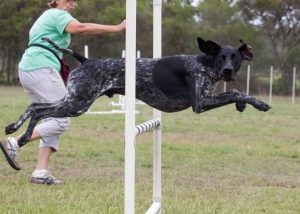Aren’t dogs supposed to do as they are told and follow so-called “commands?” They are just dogs after all. Interestingly enough, only about 20 years ago we took no for a no and children who approached dogs when they were sleeping or eating were in no uncertain terms reminded to ‘let sleeping dogs lie and leave the dog alone when he is eating’. We seemed to understand then that dogs were dogs and had a right to say no.
These days it seems we all get really upset when the dog says no with a growl or a snap and label them ‘aggressive’. What are they supposed to do? Write a letter to the editor?
Regardless of our opinion, dogs do say no and they do so fairly often. It is a good idea to listen (or may be better watch as they don’t really speak English or German for that matter).
Dogs say no in different ways. Some are very subtle some are very clear.
If the dog is lying on his bed, you approach and he growls at you. Most will understand the warning and back off. Some might say, no way, I will not allow my dog to growl at me.
You are in a training session and the dog walks off and sniffs a blade of grass intently. Pretty clear: No, I do not like this training session. Again some will say, no way, I will not accept my dog walking off and reprimand the dog.
You are meeting children on your walk, they ask to pat your dog. Your dog turns the head away. Subtle: No, I really do not want to say hello. Some will not see it or not recognise it.
You are at an Agility competition and your dog runs out of the ring. Pretty clear the dog said: No, not with me.
You are at the dog park and say sit! Your dog looks blankly at you and does not sit. Obviously the answer is no.
There are different reasons why dogs say no. Here just some of them:
Lack or incomplete training: The dog just does not understand what you want in that specific situation. This often happens if the cue and associated behaviors have not been proofed against competing motivations or generalized to different environments/situations. A classic is the puppy who understands sit in his own home, but once she is in a different environment cannot follow the cue.
The dog is scared or nervous: If the dog is in a situation where she feels not comfortable, she might indicate that she wants to get out with subtle signs like head turns, lip licking or yawning. If we do not take note she might start moving away, and if that does not help, bark, growl, snap or bite.
Trigger stacking: It is just all too much. Imagine you are getting up in the morning, no milk in the fridge, you leave the house and the neighbor yells at you because your dog barked during the night and when your reverse your car out of the drive way, you get almost hit by a truck. The next person to say something will be yelled at, regardless of what she said. It is the same with dogs, they might have woken up during the night, the man with the dark hat scared them and then the dog next door barked at them. He just cannot take any more.
One that often gets ignored: The dog is just having an off day. Yes, like for all of us, some days are better than others. I think I am a pretty well balanced person, but I do have off days.
How are we dealing with these situations? This depends on how we, as the trainer or the owner, define the relationship with our dogs. Some might say: I do not care what my dog says he has to do whatever I tell him to. Some might take note and try to figure out why the dog said no and address the concerns the dog has.
The first approach was and is still common, the relationship is seen as a struggle for dominance and ‘who is boss’.
The second approach is based on a more cooperative view and a team work where the members of the team solve the problem in a joint effort. Obviously it can never be a completely ‘equal’ relationship because the dog depends on us for whatever they do and get. They also do not have the mental capacity or reasoning faculties of humans. However, there are tasks that dogs are much better equipped to perform than humans for example tracking or sniffer work.
Do not get me wrong, in the end the humans are responsible for their dogs and the dogs’ behaviour and in no way am I advocating a ‘laissez fair’ or permissive approach.
However, dogs being dogs, if they say no and we ignore it they will escalate the behaviour and there is a real chance of someone getting hurt.
If you ignore the growling of the dog who is asleep or eats and just proceed to do whatever you intended to, the dog might indeed bite you.
If the children proceed to pat your dog anyway, despite her saying no, she might try to move away, become really scared and next time growl or snap.
If your dog keeps running out of the ring in Agility, you might never get the results you want because the ‘running off’ is more rewarding than being with you.
Or if your dog sniffs that blade of grass and you drag her back to training, she might shut down completely and set your training back by weeks or months.
Other approaches would be more socialisation with children, meaning every time your dog meets children she gets really tasty treats and she might change her attitude towards children.
If your dog does not like being disturbed, let sleeping dogs lie and if you need to move him, wake him up first and ask him with a nice treat to go to another place. In regards to growling around food, prevention goes a long way and teaching your puppy to accept people approaching the food bowl should be part of the puppy pre school curriculum with food bowl exercises and exchanging.
The dog calling it quits in a training session might tell you, that you are not enough fun and your rewards just not good enough. The dog who forgot how to sit might just need a bit more positive training.
I personally take it seriously when my dog says no and if it is a socialization issue will embark on remedial socialization immediately. This means I will take my dog out more often and will associate any potentially scary stimulus, like children coming up, with really great stuff happening to my dog. This can be BBQ chicken, a fun game, praise or pats, depending on the dog.
If it is a training issue I will make my training more fun and exciting. I will also increase the reinforcement rate.
Acknowledging the no and doing something about it will make you a better trainer and the two of you a better team. There is really nothing wrong with letting them say no and change the situation for the better.



